Floyd Little, the legendary Broncos running back who was inducted into the Pro Football Hall of Fame in 2010, has died, his family announced. He was 78.
"Everyone with the Denver Broncos family is heartbroken with the passing of Floyd Little," President and CEO Joe Ellis said. "Without question, Floyd was one of the greatest Broncos of all-time and an unforgettable part of our history. He rightfully earned the nickname 'The Franchise' for his profound impact on this organization, helping to put the Broncos on the pro football map in the early days. As the first Pro Football Hall of Famer to star for the Broncos, Floyd brought credibility to this team while becoming one of the most dominant players of his era. Seeing him finally receive that Gold Jacket was the culmination of a tremendous lifetime in football. Even after his retirement, Floyd was a wonderful ambassador for the game and the Denver Broncos, carrying himself with warmth, kindness and class — always with humility and a smile. In recent months, he faced his cancer diagnosis with the same grit and determination that defined his incredible playing career. On behalf of the Broncos, we extend our deepest condolences to Floyd's wife, DeBorah, the entire Little family, his many fans and all of his loved ones."
Little's personal story was that of triumph after years of struggle. Perhaps that's what made him so perfect to lead the Broncos in the late '60s and early '70s.
There are no easy paths to the NFL, and even fewer to enduring football greatness — but Little's childhood seems to have been about as hard as any. His father died of cancer when he was 6 years old, and to help support his family, Little shined shoes. His difficulties learning and performing in school tests meant that he had to spend two years at a military institute improving his grades before he could enroll at Syracuse.
"The only thing I had was a dream," he said during a visit to his hometown in 1988. "I was on welfare, had no money, no promises and no guarantees."
He was a standout running back at Syracuse, where he wore No. 44 like star running backs Jim Brown and Ernie Davis before him. Little earned All-America honors in 1964-66 and was then selected by the Broncos with the sixth-overall pick.
Affectionately known as "The Franchise," Little arrived in Denver in 1967 with a unique status as the first first-round pick to sign with the team. Prior to 1967, the AFL and NFL had separate drafts, and the Broncos lost each of their top picks to more-established and more financially stable teams in NFL.
His arrival marked a new era for the Broncos, who were 26-69-3 in their seven seasons to that point. More than that, the Broncos were considered something of a laughingstock in the AFL — the runtish team of the runtish league. Little didn't immediately change that reputation, but he would do it in time.
It would take him a season to establish himself as one of the league's top running backs, but he showed the ability to make an immediate impact whenever he could get the ball in his hands. In his first season, he totaled an AFL-leading 1,626 all-purpose yards, including 1,212 yards on punt and kick returns.
He maintained that stature in his second season, and did so as he entered the AFL's top 10 in rushing yards. The effort earned him his first AFL All Star selection. It also produced one of his favorite stories, when head coach Lou Saban fired him in the middle of a game against the Bills.
Little had just fumbled as the Broncos looked to protect a narrow lead with less than a minute left.
"He told me to get off the field, get out of the stadium," Little told the Rocky Mountain News in 1992. "He said, 'You're fired. Get your [posterior] on the highway. You're gone.'"
Little refused, though, and returned to the huddle for the Broncos' final drive with 25 seconds left. He told quarterback Marlin Briscoe, "Just throw the ball as far as you can. … I'll be there. I'll catch it."
Little was true to his word. He made the 59-yard reception and then got 5 more yards because of a facemask penalty. The Broncos kicked the game-winning field goal on the next play.
As Little told it, Saban said after the game, "You have one more week."
Little, of course, lasted much longer.
The following year, Little earned a second All Star nod as he rushed for a career-high 729 yards, a total that ranked fifth in the AFL despite missing five games. At this point of his career, just three years in, Little had already become the Broncos' franchise rushing leader.
In their first season in the NFL after the merger, Little and the Broncos proved they were more than up for a new challenge. For a third consecutive year, Little improved upon the previous year's rushing output, this time running for 901 yards as he earned his first Pro Bowl selection in 1970.
A year later, though, Little would prove that he wasn't just one of pro football's top backs — he was the best. In 1971, he was the NFL's leading rusher as he galloped to 1,133 yards, the Broncos' first 1,000-yard rushing season.
Relive Floyd Little's prolific career with the Broncos and several memorable moments as a Broncos alumnus with these rarely seen photos.
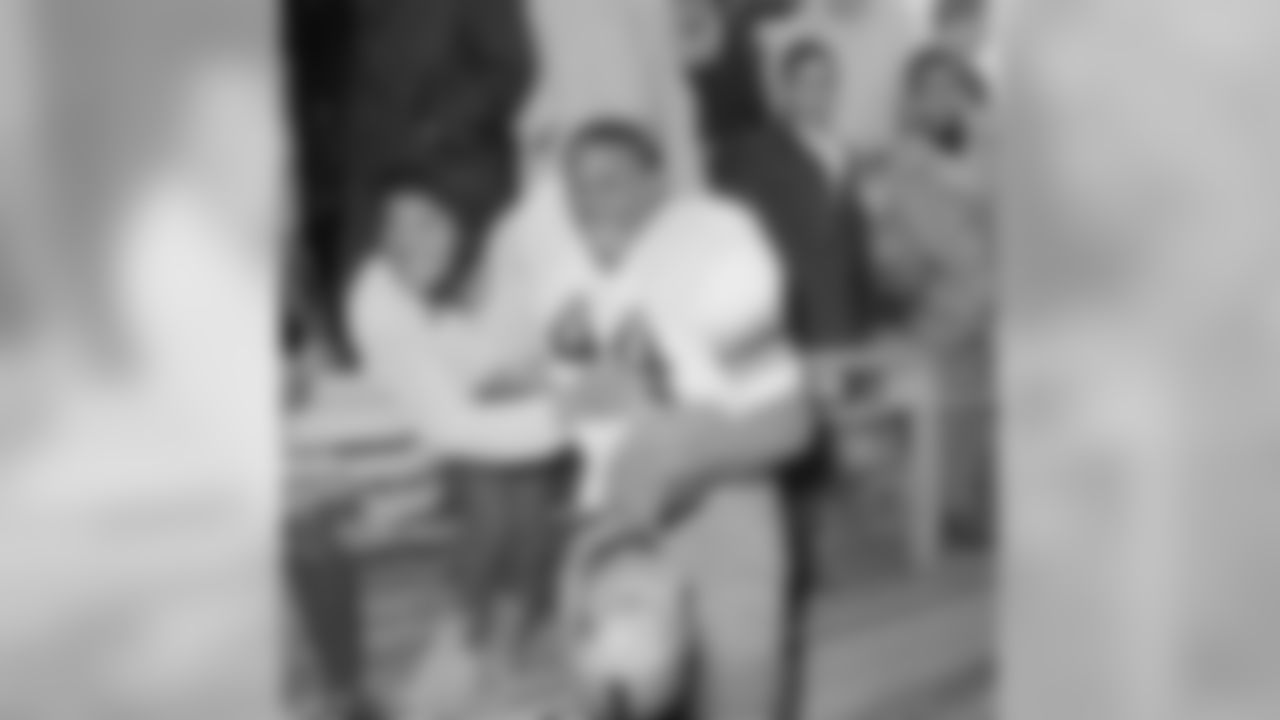
Floyd Little and his mother Lula Little, New Haven, Connecticut, have a hug for each other and a smile for the photographer after Floyd's standout performance in 51-13 stomping of Pitt by Syracuse on Oct. 30, 1965 at New York's Shea stadium. Little romped for four touchdowns, one a 95 yarder. (AP Photo)
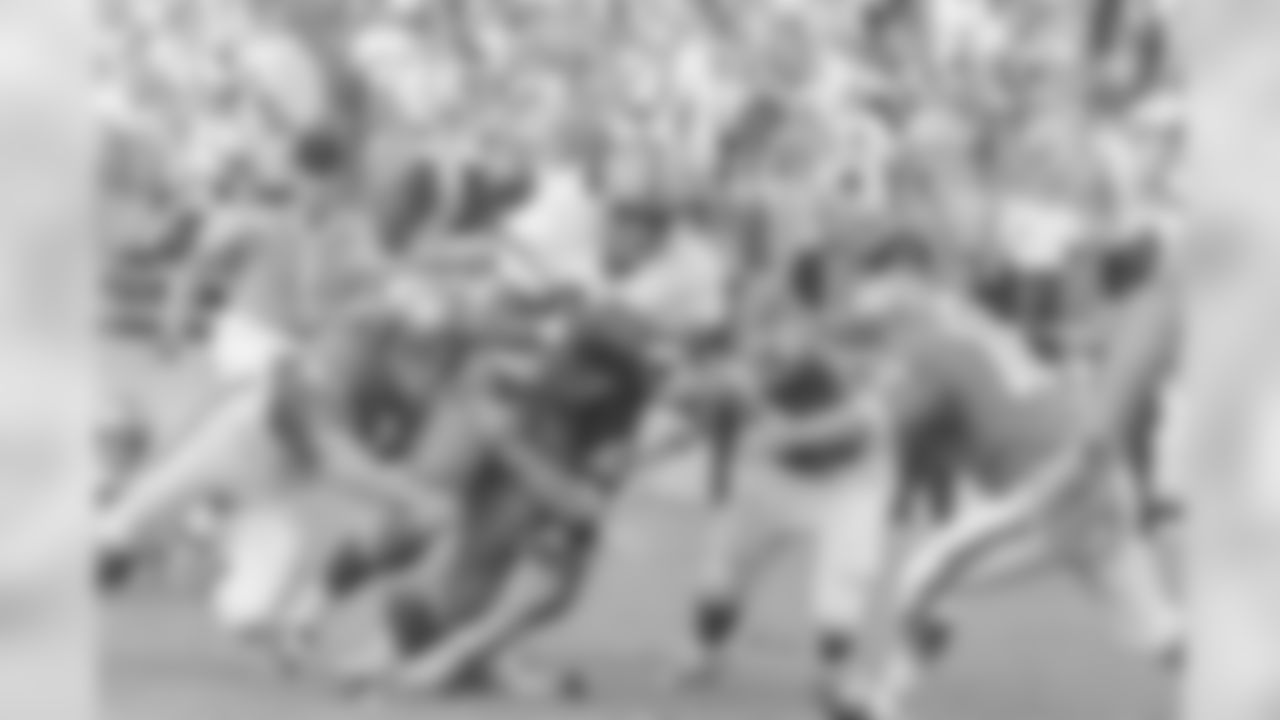
Syracuse Orangemen's Floyd Little (44) keeps charging down the field despite efforts of Baylor's Willie Walker (83) and Paul Ortiz (30) trying to stop the hard running halfback during third quarter of their game on Sept. 12, 1966 at Baylor Stadium in Waco, Texas. Coming in to assist on the play are O.B. Goolsby (50) and Bob Purvis (18). Baylor won the non-conference game, 35-12. (AP Photo/FK)

Floyd D. Little, Syracuse halfback, holds Player of the Year award presented to him at the 12th annual dinner of the Eastern College Athlete conference in New York on Dec. 8, 1966. (AP Photo)

Halfback Floyd Little poses after becoming the first first-round draft pick to sign with the Broncos.

Floyd Little and Bo Hickey candid
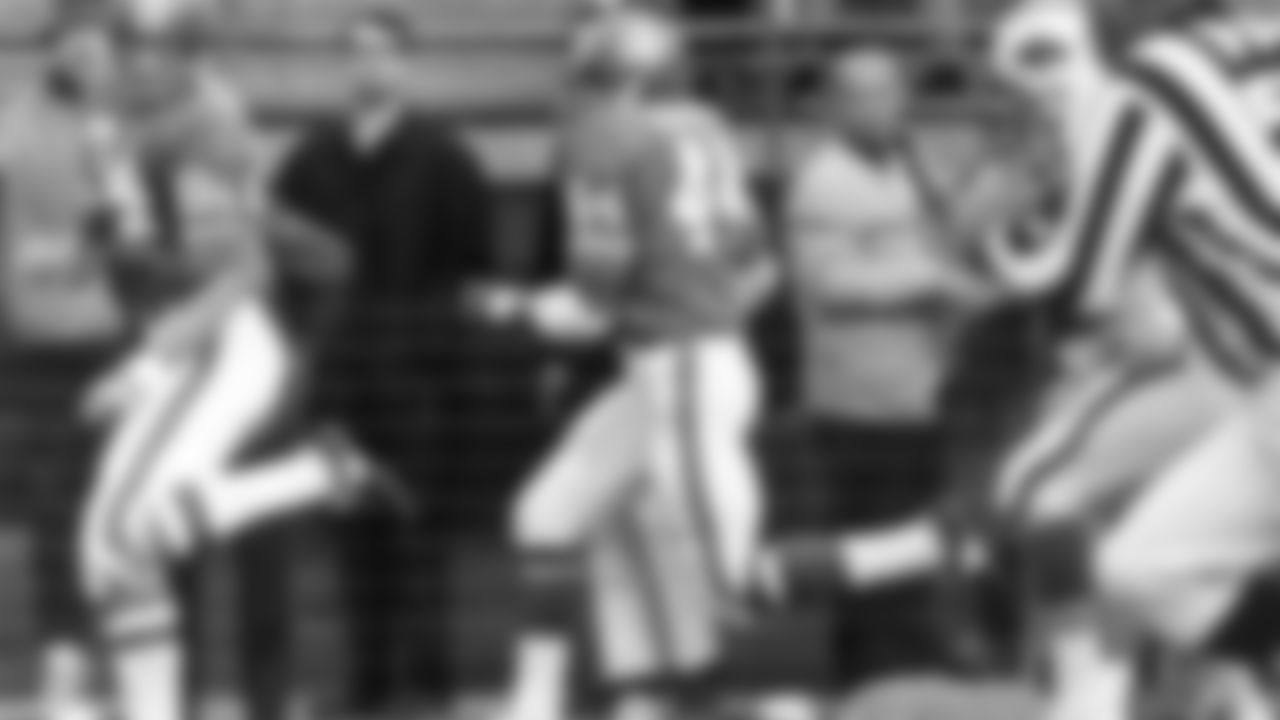
Halfback Floyd Little runs downfield behind lead blocker Mike Haffner on a 66-yard touchdown run during a November 24, 1968 win (34-32) over the Buffalo Bills at Bears Stadium.
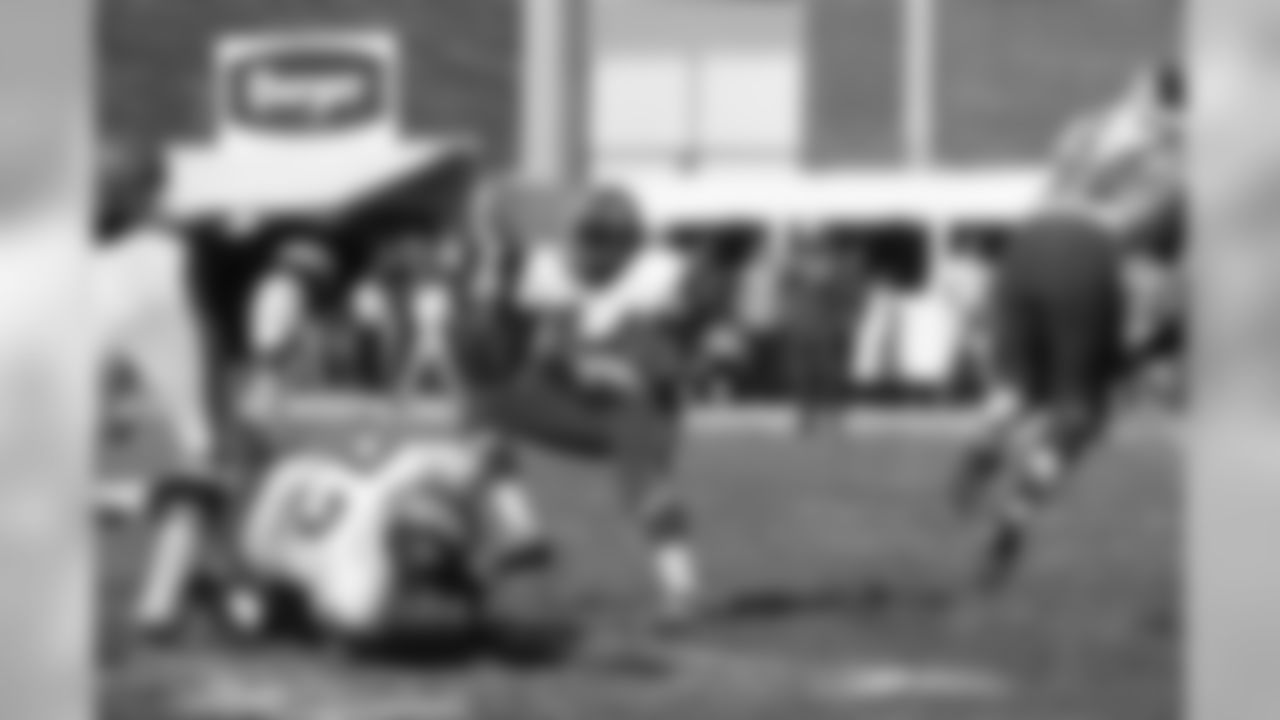
Denver Broncos halfback Floyd Little (44) is seen in action circa 1969. (Tony Tomsic via AP)

Denver Broncos halfback Floyd Little (44) circa 1969. (Tony Tomsic via AP)
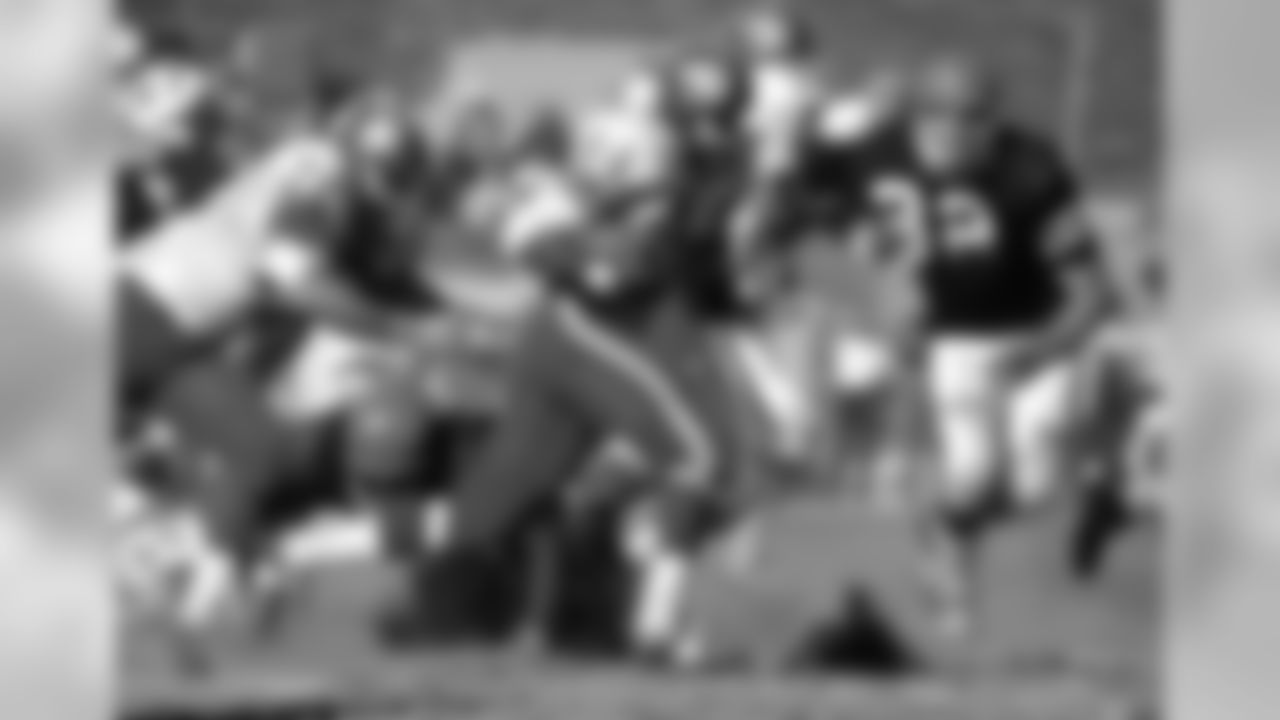
Denver Broncos halfback Floyd Little (44) is seen in action circa 1969. (Tony Tomsic via AP)
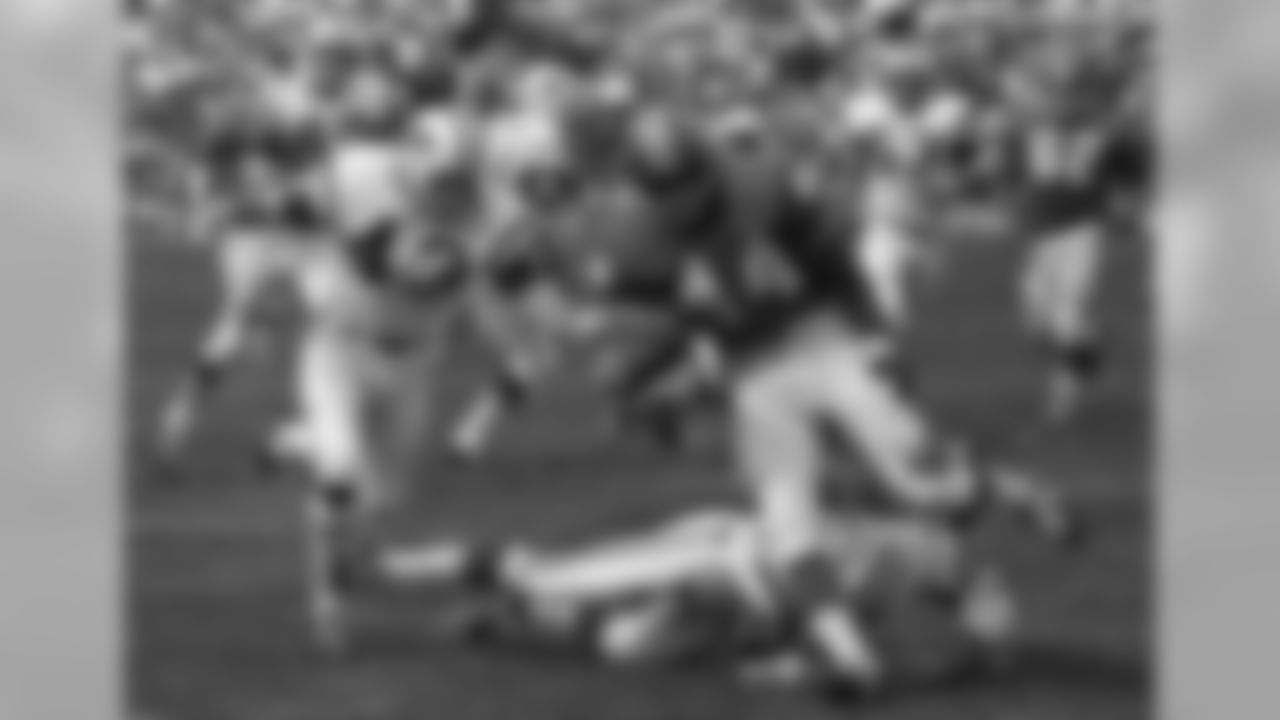
FILE - In this September 1969 file photo, Denver Broncos' Floyd Little avoids the tackle of New York Jets' Steve O'Neal (20) during a football game in Denver. At left is Jets' John Dockery (43). In August 2009, a month after retiring from the car business by shuttering the dealership he'd run for 32 years, Little was finally a Pro Football Hall of Fame nominee, something he had started to suspect he'd never see in his lifetime. (AP Photo/File)
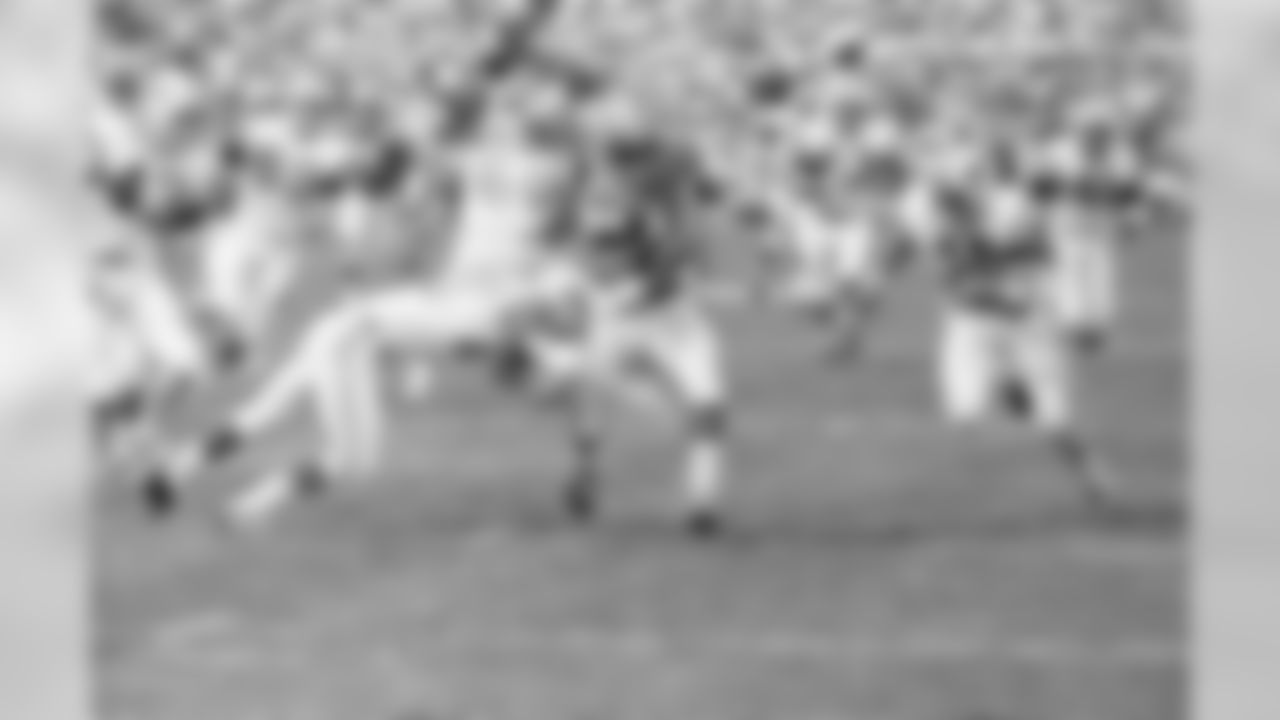
Floyd Little (44) of the Denver Broncos avoids the tackle of Jets' Steve O'Neal (20) and continues on his way to the Jets 1-yard line where he was tripped up in Denver, Colo., Sept. 22, 1969. Little returned a Jet kick for 56 yards during the second quarter to set up a Denver touchdown on the next play . Jets players in background are: John Dockery (43), Stewart Wayne (89) and Pete Perreault. The Broncos scored an upset 21-19 win over the Jets before a standing room only crowd of 51,000. (AP Photo/Bob Scott)

Halfback Floyd Little tries to turn the corner as linebackers Gordon Lambert and Ken Criter block during a September 29, 1969 win (21-19) over the New York Jets at Mile High Stadium.

Los Angeles Rams running back Jack Snow (left) snaps a souvenir picture of the Denver Broncos running back Floyd Little and Spec. 4 Charles Perea (Salida, California) during a handshaking tour at a military hospital in Saigon on Jan. 28, 1970. Perea is in the hospital recovering from wounds from a booby trap explosion during an operation in the Mekong Delta. At center is St. Louis Cardinals defensive end, Charles Walker. (AP Photo/Dang Van Phuoc)
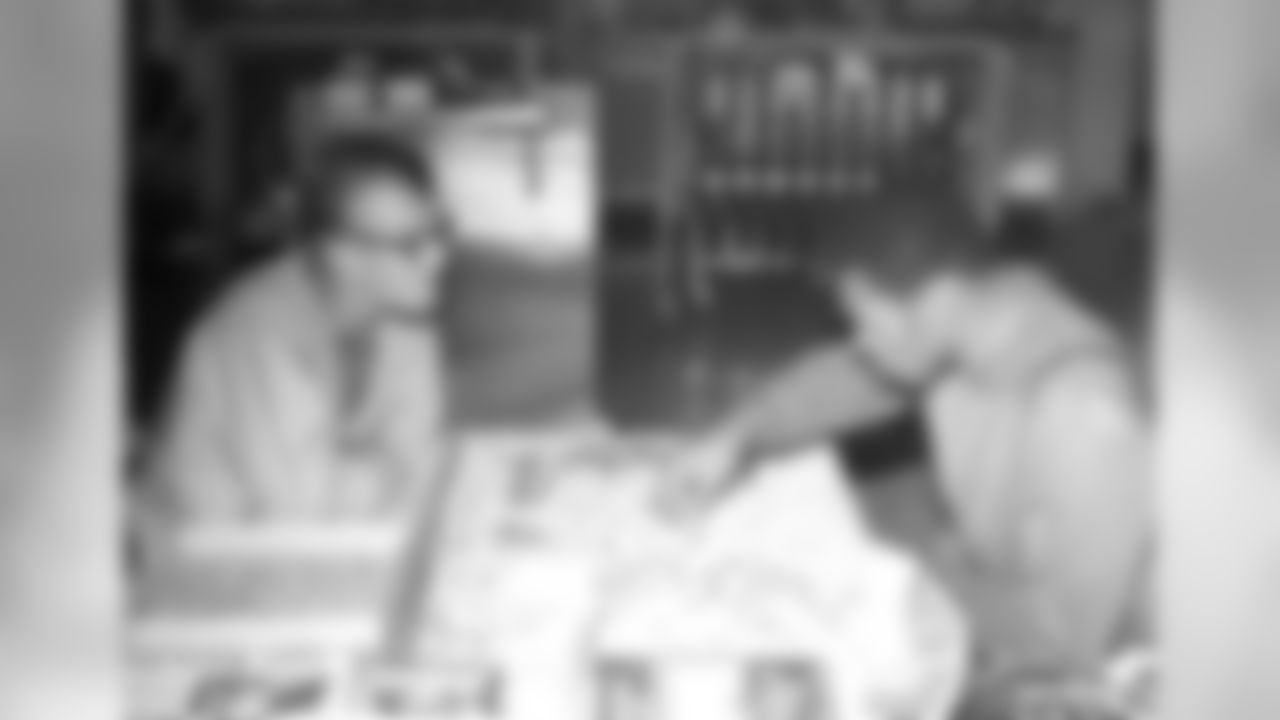
Pfc. Stanley M. Serokal, a patient at a military hospital in Saigon, gets a hand on a a puzzle from Denver Broncos' running back Floyd Little, Jan. 28, 1970. Led by Bill Granholm of the Football Commissioner's office, Little and four other professional players are currently on a two-week tour of the war zone. The visit to the Saigon hospital marked their first full day of activities in Vietnam. (AP Photo/Dang Van Phuoc)
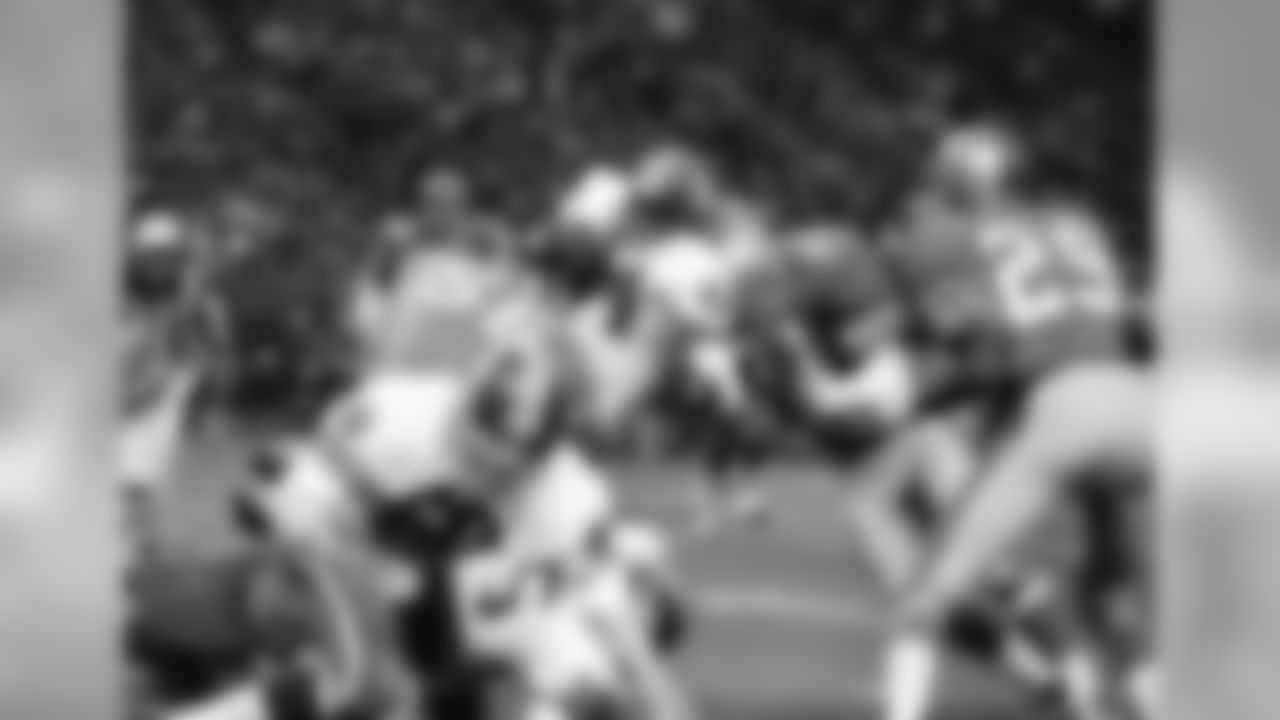
Denver Broncos running back Floyd Little (44) as he was headed off by Houston Oiler Olen Underwood (56) and Tom Domres (71) in the first quarter of the game in the Houston Astrodome on Nov. 29, 1970. Little tried over his right tackle and picked up three-yards as teammates Bob Young (60) and Clem Turner (35) tried to open up a hole for him. (AP Photo/EFK)

Floyd Little

Halfback Floyd Little tries to break through Chiefs tacklers during an October 4, 1970 win (26-13) over Kansas City at Mile High Stadium.

Dickie Post and Floyd Little

Denver Broncos halfback Floyd Little (44) looks on from the sideline circa 1971. (Tony Tomsic via AP)
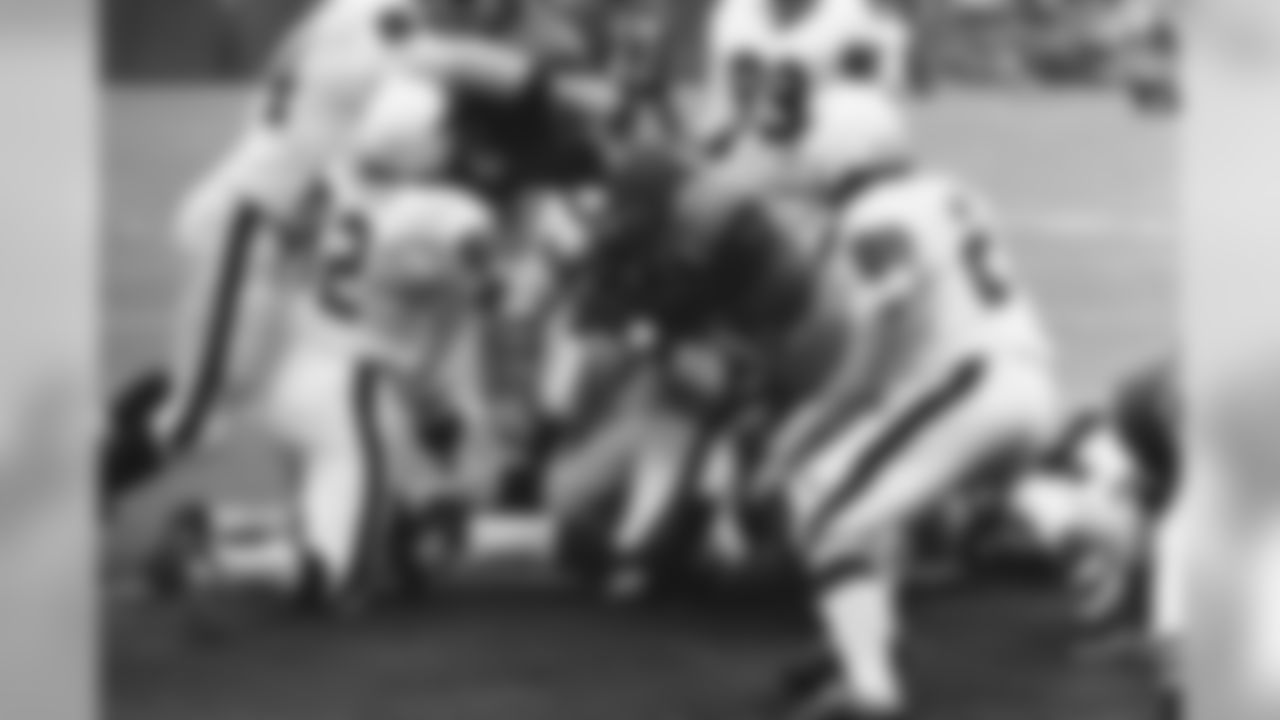
Floyd Little (44) Denver Broncos back, plunges over the goal line from the 1-yard line for a second period touchdown in a Broncos Philadelphia Eagles pro-football game, Sunday, Oct. 31, 1971, Philadelphia, Pa. In background is Broncos quarterback Don Horn (13). Eagles trying vainly to block score are end Dick Harris (84), linebacker Tim Rossovich (82) safety Bill Bradley (28) and end Steve Zabel (89). Eagles won, 17-16. (AP Photo/Bill Ingraham)
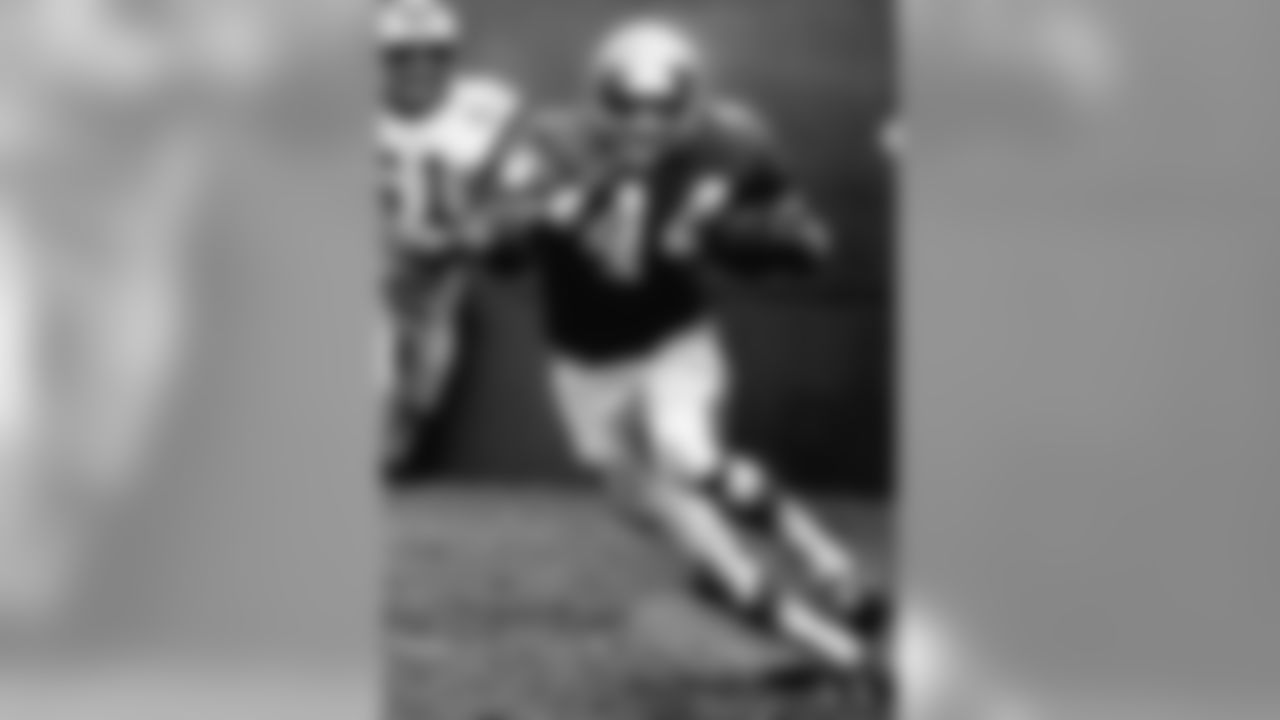
Running back Floyd Little runs the ball downfield during a game against the Philadelphia Eagles at Mile High Stadium.
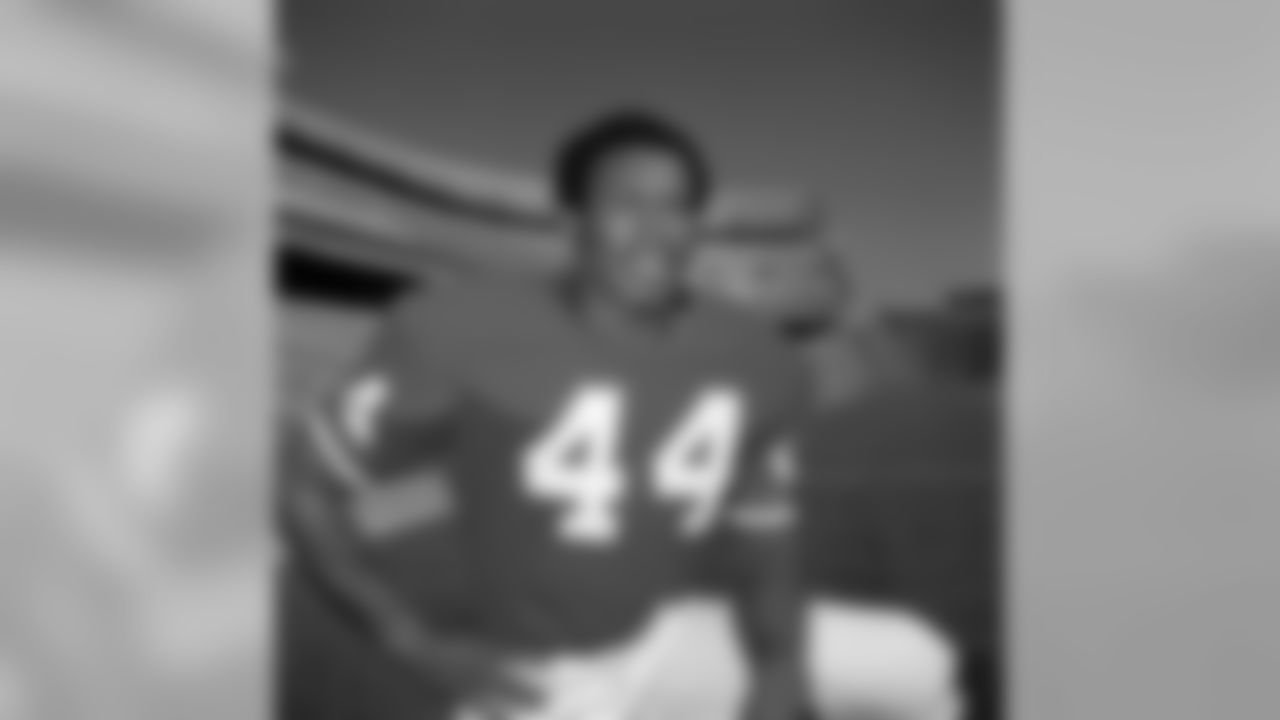
Floyd Little, running back for the Denver Broncos, 1972. Location unknown. (AP Photo)

Steve Owens of the Detroit Lions, left, Floyd Little of the Denver Broncos, center, and Willie Ellison of the Los Angeles Rams chat at the annual meeting of the 1,000 Yard Club at Appleton, Wisconsin on June 13, 1972. The three players and John Brockington of the Green Bay Packers and Larry Csonka of the Miami Dolphins gained more than 1,000 yards last season for their respective teams. (AP Photo/Paul Shane)
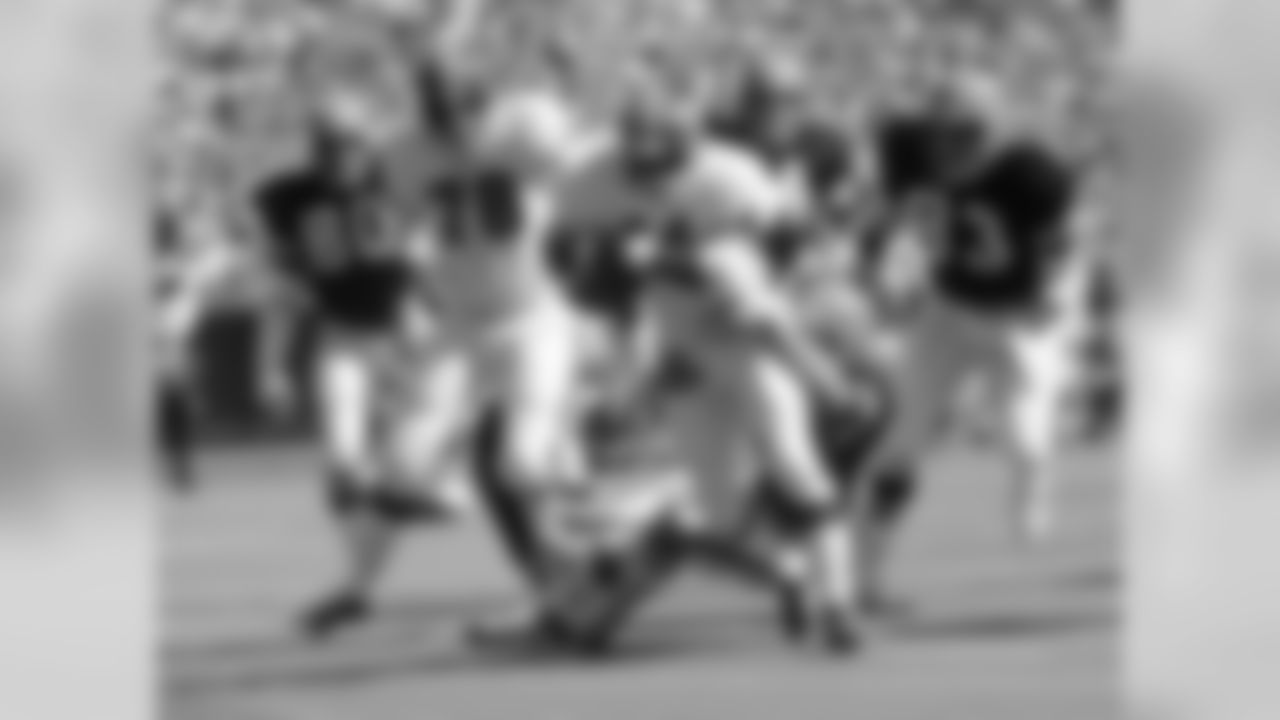
Denver Broncos Floyd Little (44) during a game from his 1972 season with the Denver Broncos. Floyd Little played for 9 seasons, all with the Denver Broncos, was a 5-time Pro Bowler and was inducted to the Pro Football Hall of Fame in 2010.(David Durochik via AP)
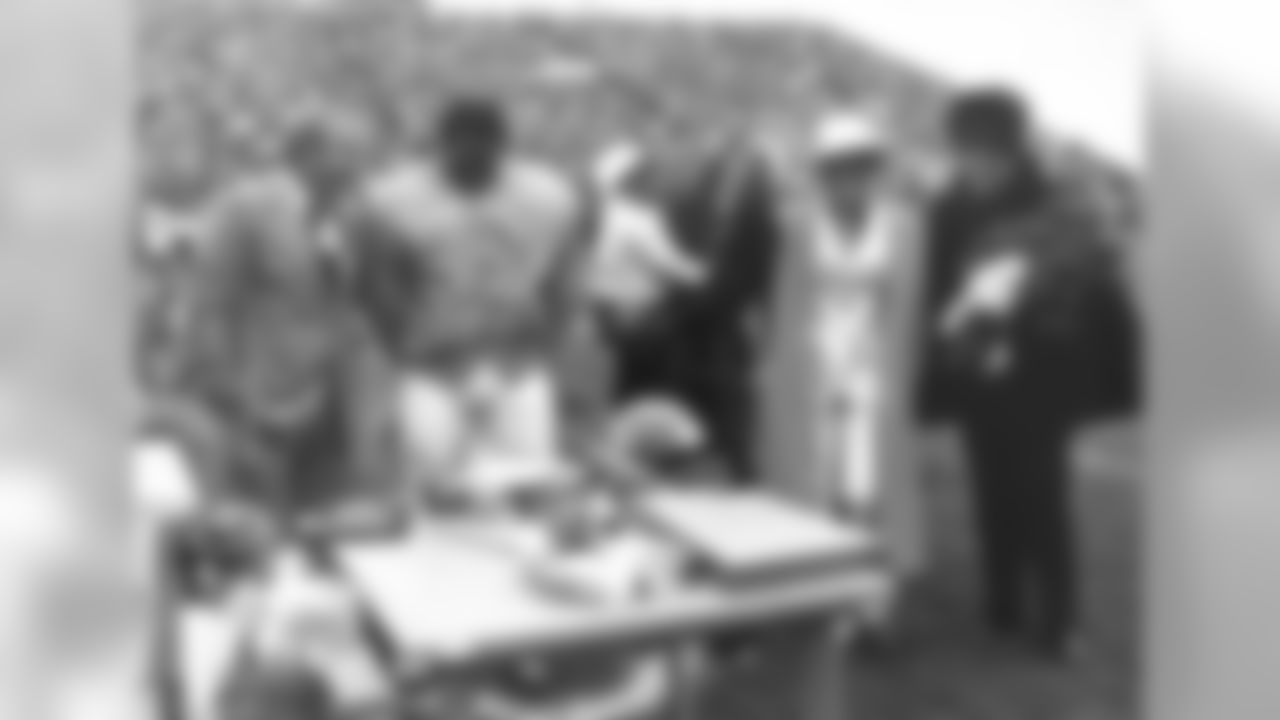
Floyd Little is honored on Floyd Little Day as the 1971 NFL Rushing champion (1133 yards) before an October 29, 1972 loss (20-27) to the Cleveland Browns at Mile High Stadium.

Former National Football League running back star Jim Brown left, chats with Mrs. A. Marie Fleming of Elmira, N.Y. and former Syracuse running back Floyd Little at a dinner, Friday, Oct. 19, 1979, New York. The dinner was held to honor former Syracuse University running back Ernie Davis. Davis, son of Mrs. A. Marie Fleming and the first black to earn the Heisman Trophy, died of leukemia in 1963 but is to be inducted into the National Football Foundation Hall of Fame on Saturday. (AP Photo/Bailey)

Floyd Little of the Denver Broncos is presented the YMCA-Brian Piccolo Award for humanitarian service at Helms Hall in Los Angeles on Nov. 20, 1973, by Dr. Robert W. Harlan, executive director of the YMCA's national council. The award, in memory of the late Chicago Bears' running back, was made to Little for his work against drug abuse among young people. (AP Photo/David F. Smith)
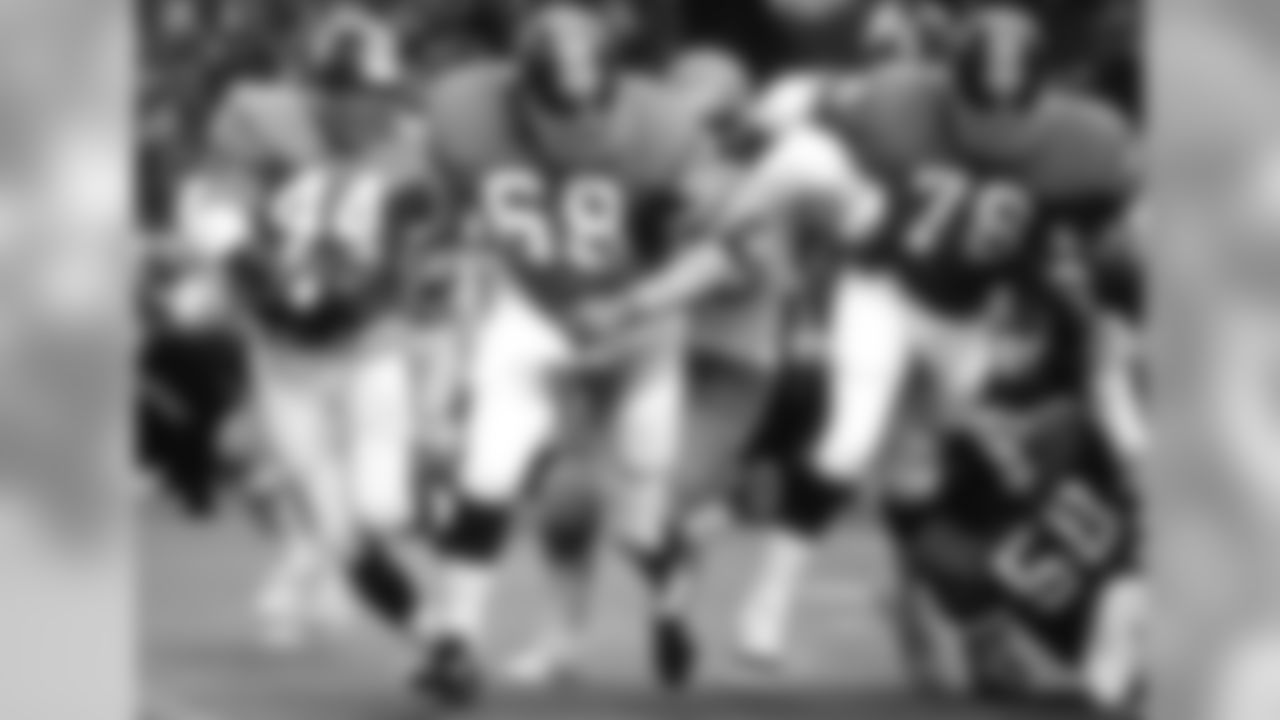
Floyd Little runs behind blockers during an undated game.

Denver Broncos Floyd Little (44) during a game from his 1975 season with the Denver Broncos. Floyd Little played for 9 seasons, all with the Denver Broncos, was a 5-time Pro Bowler and was inducted to the Pro Football Hall of Fame in 2010.(David Durochik via AP)
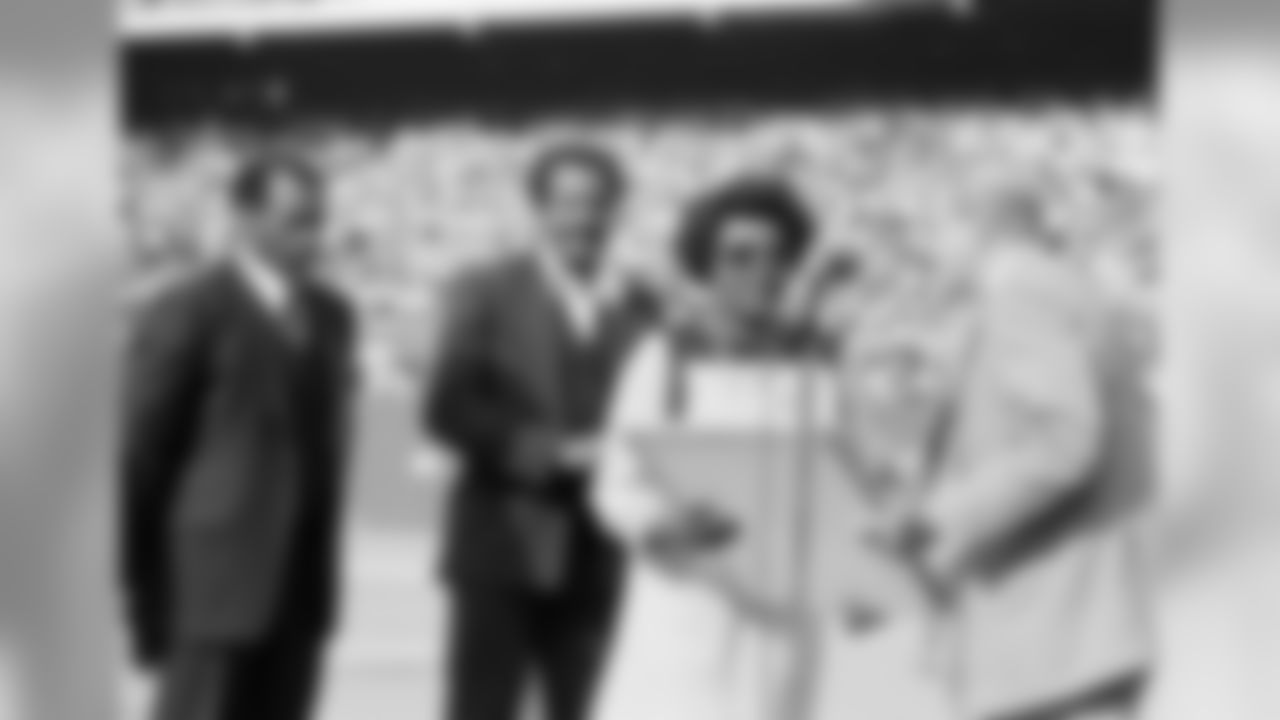
Mrs. Marie Fleming receives a plaque honoring her late son, Ernie Davis, who was inducted into the College Football Hall of Fame during half-time ceremonies at Giants Stadium on Saturday Oct. 20, 1979 as Syracuse hosted Penn State. Presenting the plaque is Vincent Draddy, President of the National Football Foundation Hall of Fame, as Floyd Little, left, who was recruited to Syracuse by Davis, and former Cleveland Browns back, Jim Brown look on. (AP Photo/Kostroun)

Floyd Little carries the ball
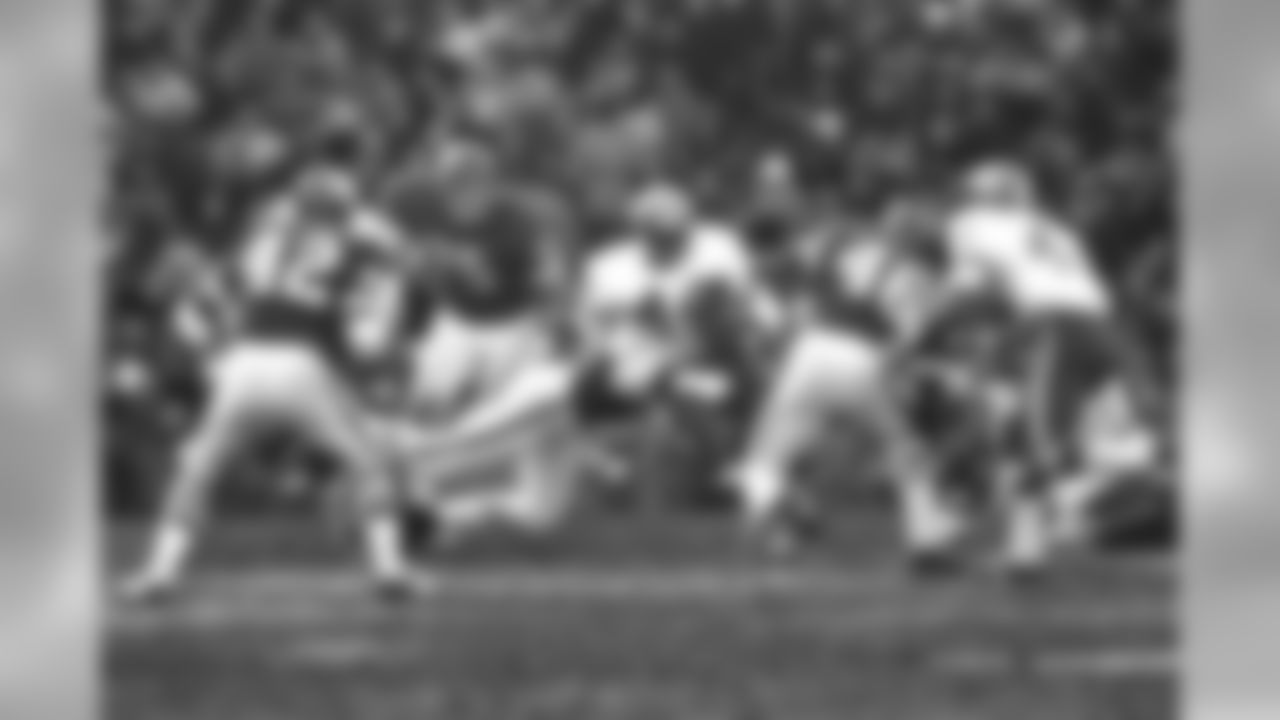
Floyd Little carries the ball against the Kansas City Chiefs
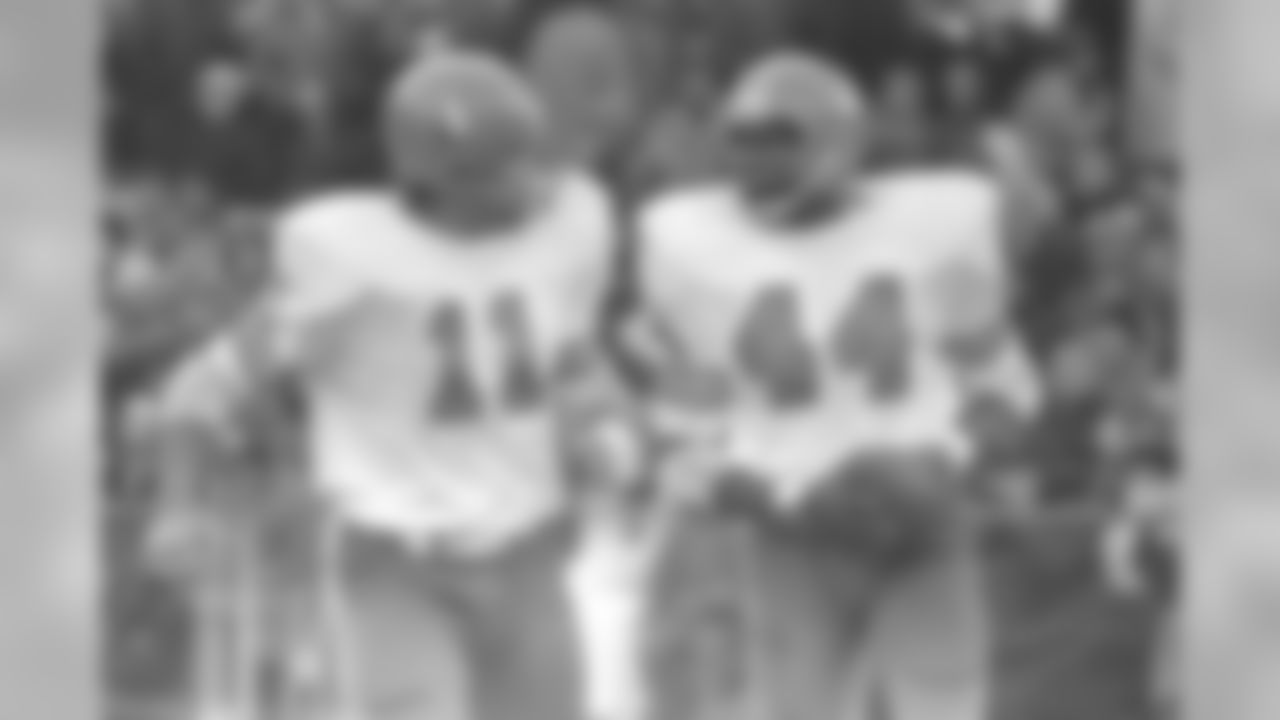
Bobby Anderson and Floyd Little
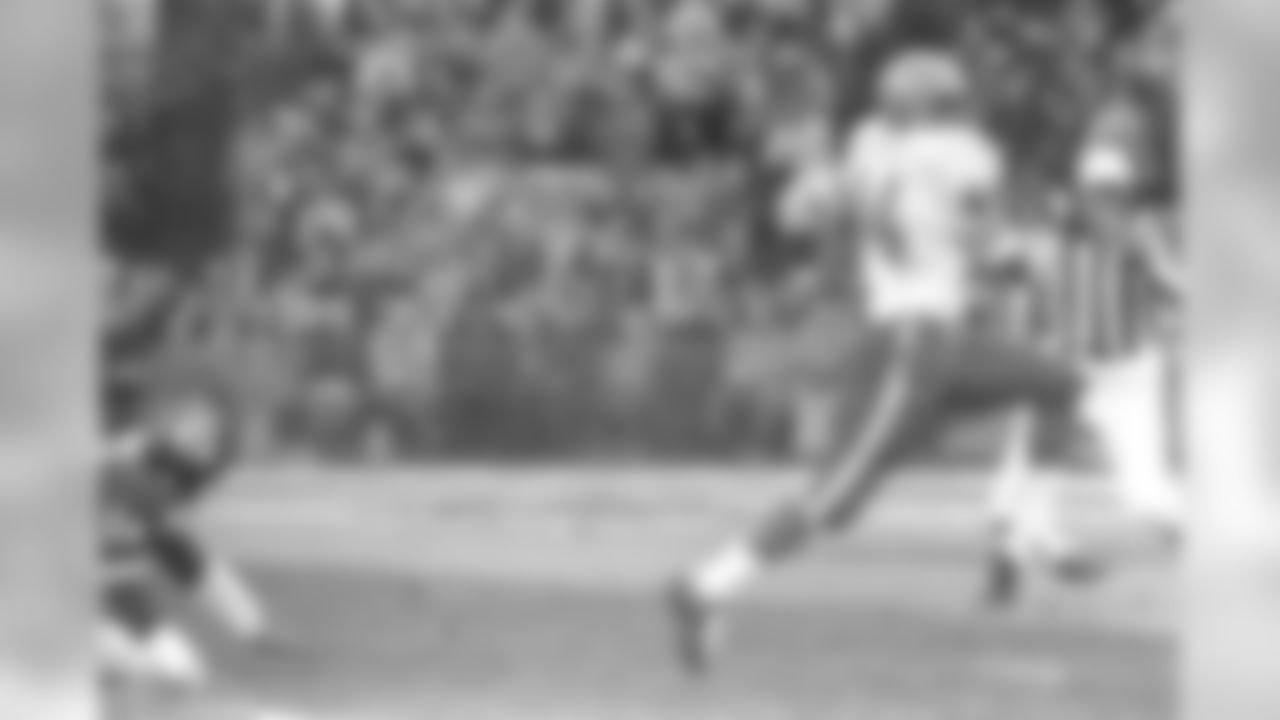
Floyd Little carries the ball

Floyd Little carries the ball
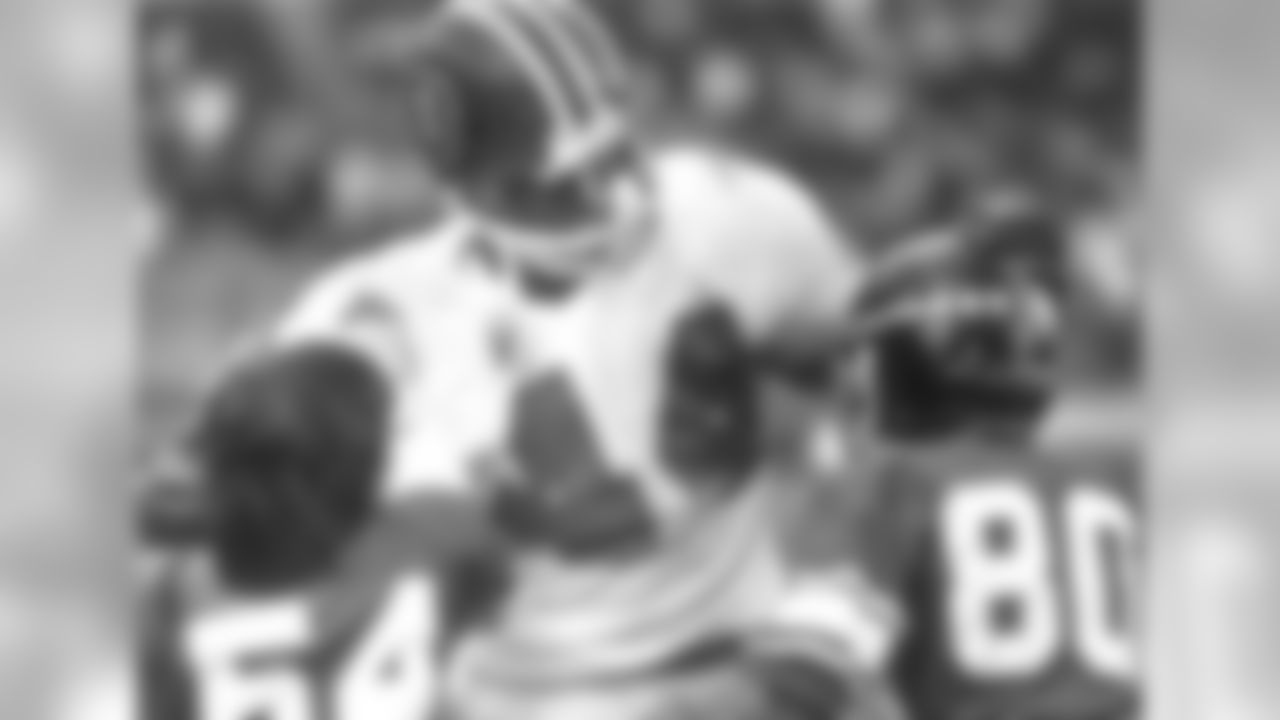
Floyd Little teases two youth football players

Mike Current blocks for Floyd Little
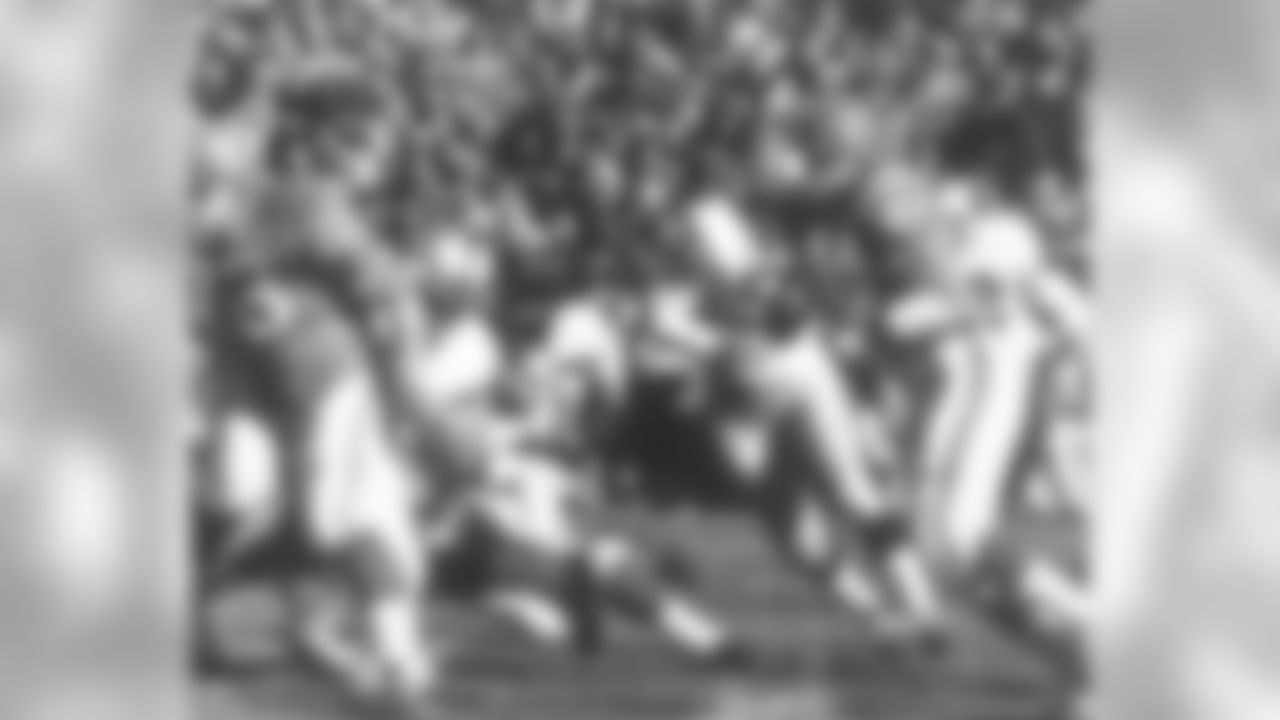
Floyd Little runs versus the Raiders

Floyd Little carries the ball against the Kansas City Chiefs
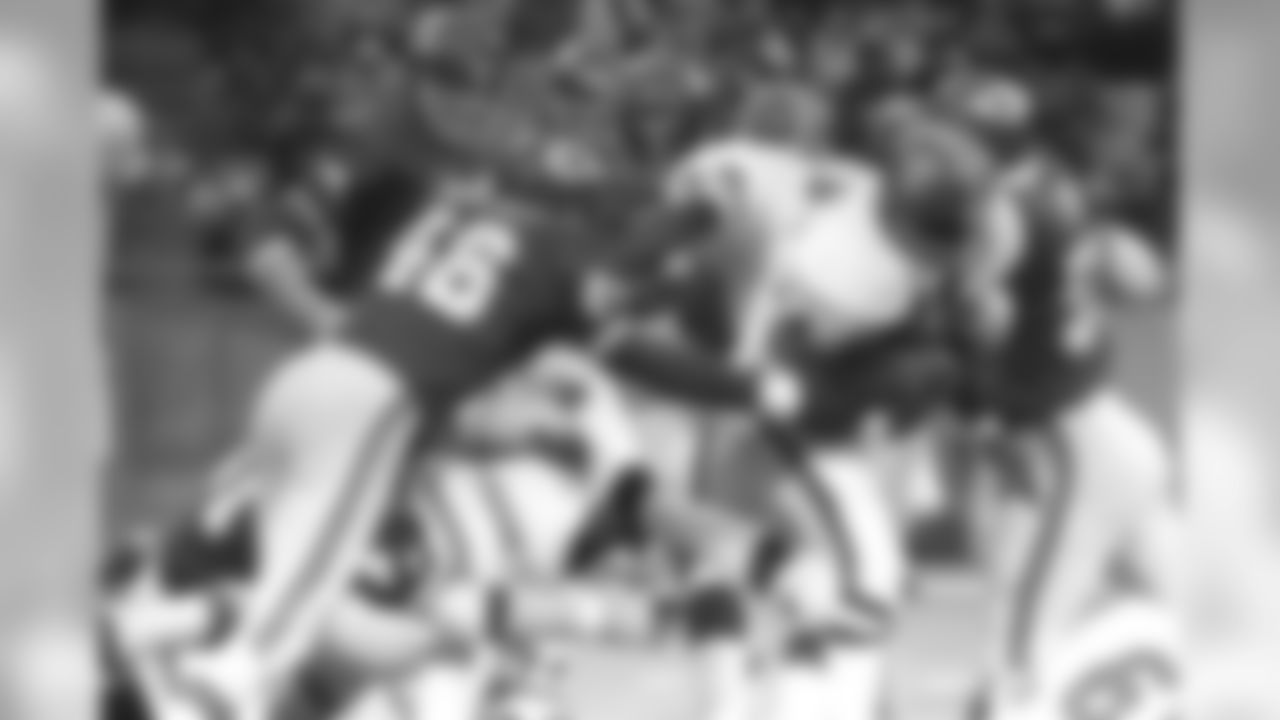
Floyd Little carries the ball against the Kansas City Chiefs
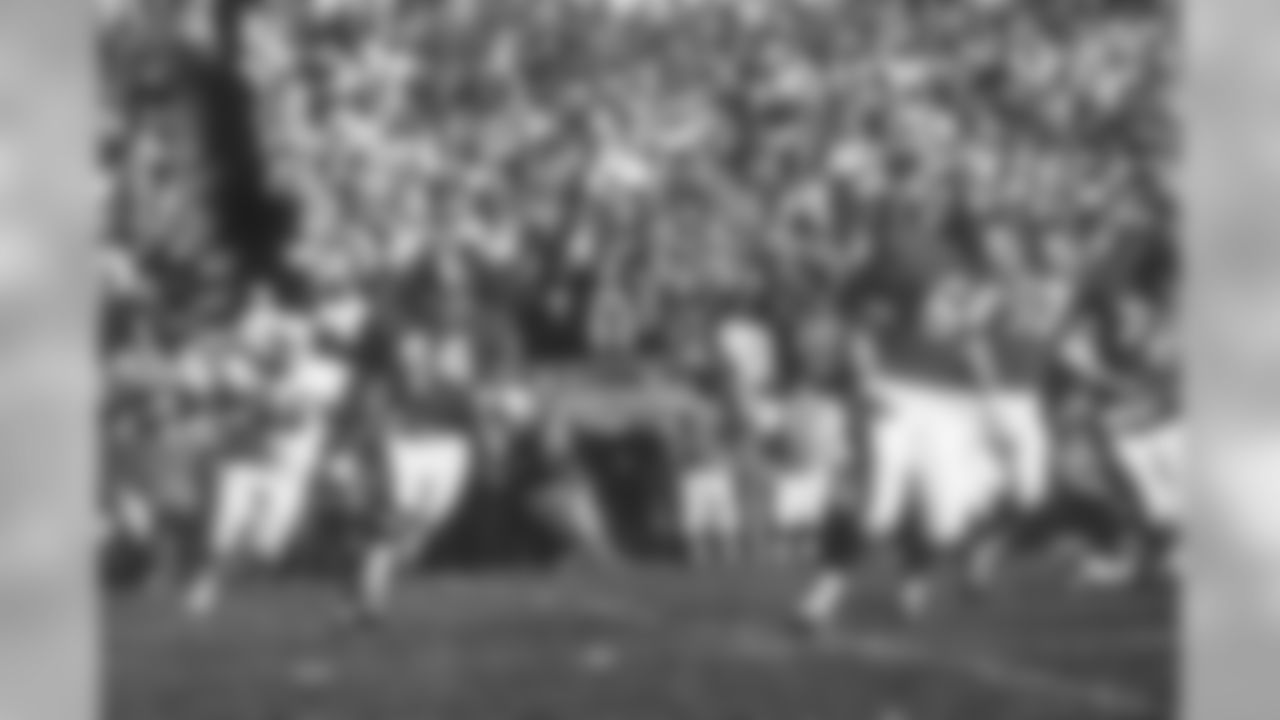
Floyd Little runs versus the Dolphins

Floyd Little take the handoff
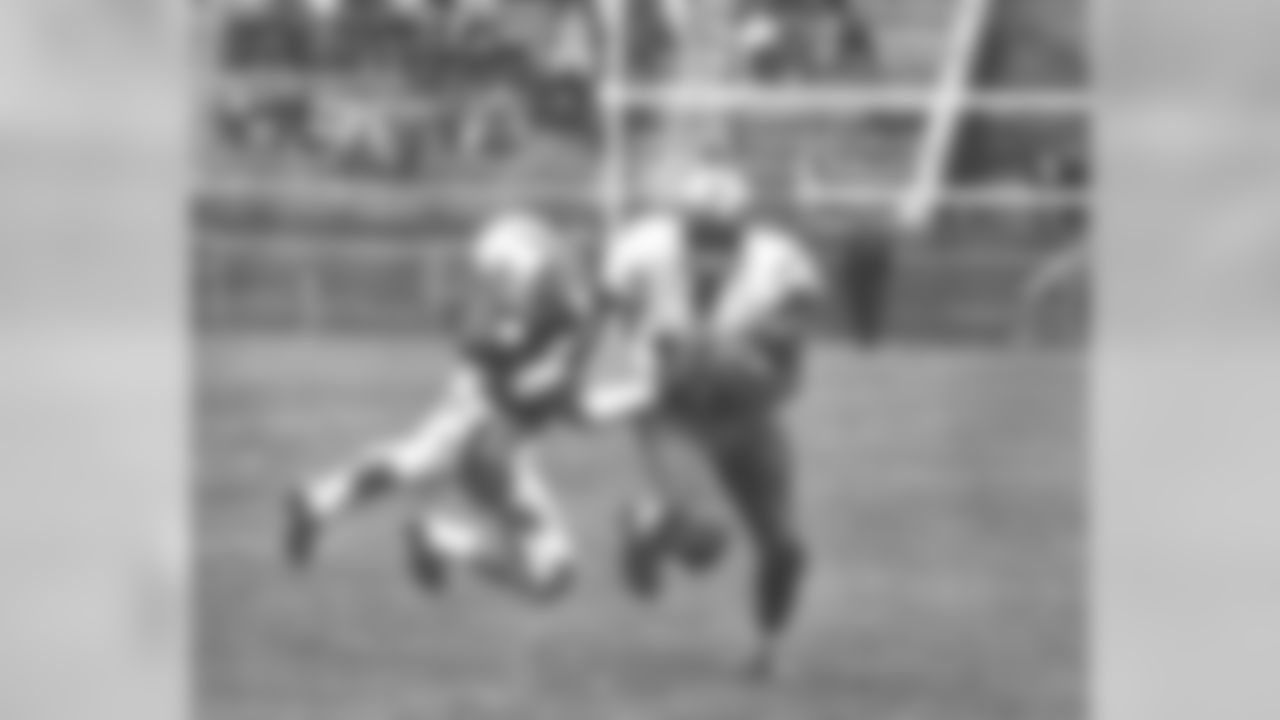
Floyd Little trys to shake a tackler
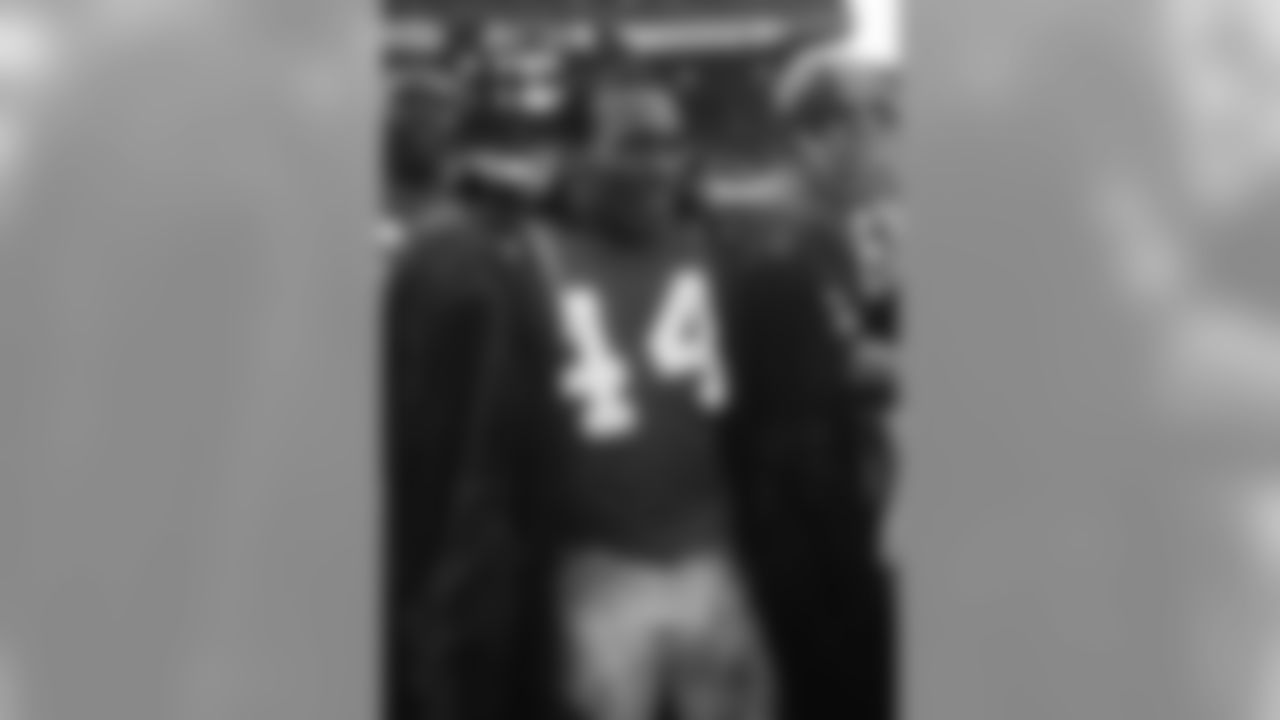
Denver Broncos halfback Floyd Little (44) looks on from the sideline during an NFL game in this undated photo. (Tony Tomsic via AP)
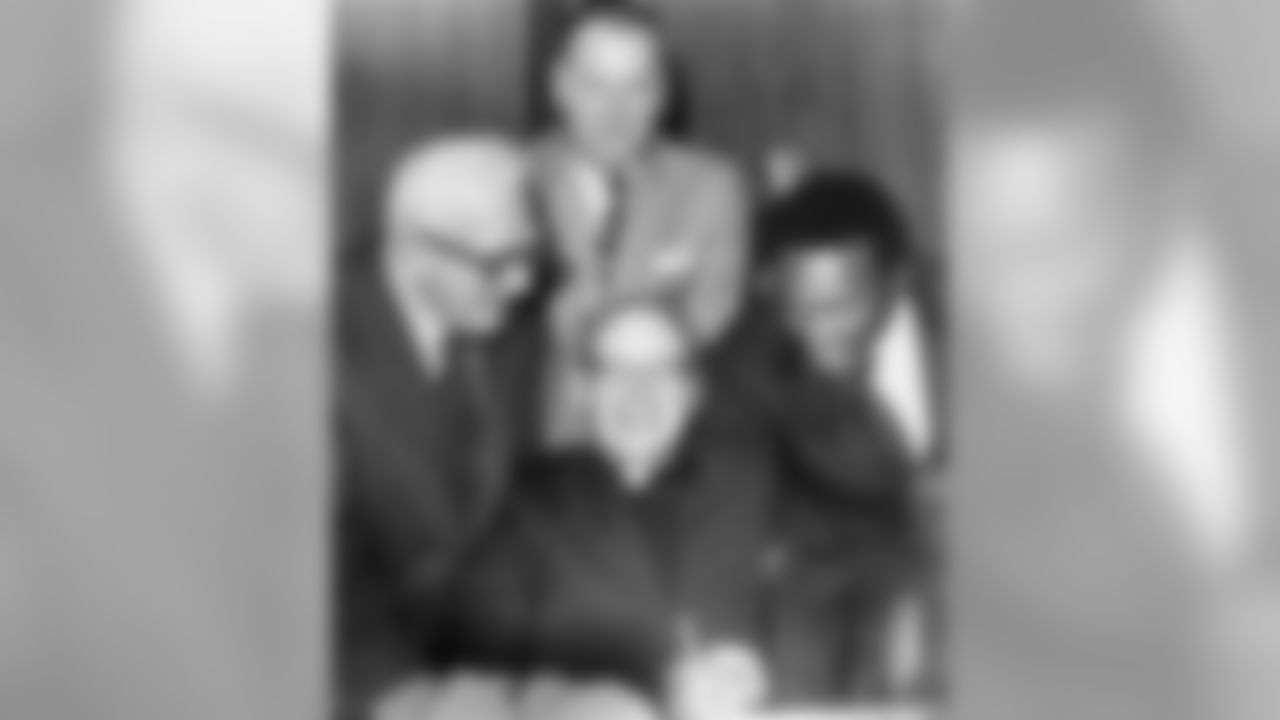
Floyd Little, a running back for the Denver Broncos, autographs a program for the Rev. Robert Keating during the Connecticut Sports Writers Alliance Gold Key Award dinner in Hartford, Conn., Jan. 29, 1973, as Tom Kelley and baseball commissioner Bowie Kuhn look on . Keating, Kelley and Little were the recipients of the Alliance's Gold Key awards and Kuhn was the main speaker at the dinner. From left: Kelley, Kuhn, Little. Seated is Keating. (AP Photo/Bob Child)

Floyd Little, Pat Bowlen, and Billy Thompson met in the locker room following the Broncos victory over the Seahawks against the Seattle Seahawks at Kingdome in Seattle, WA on October 11, 1998.
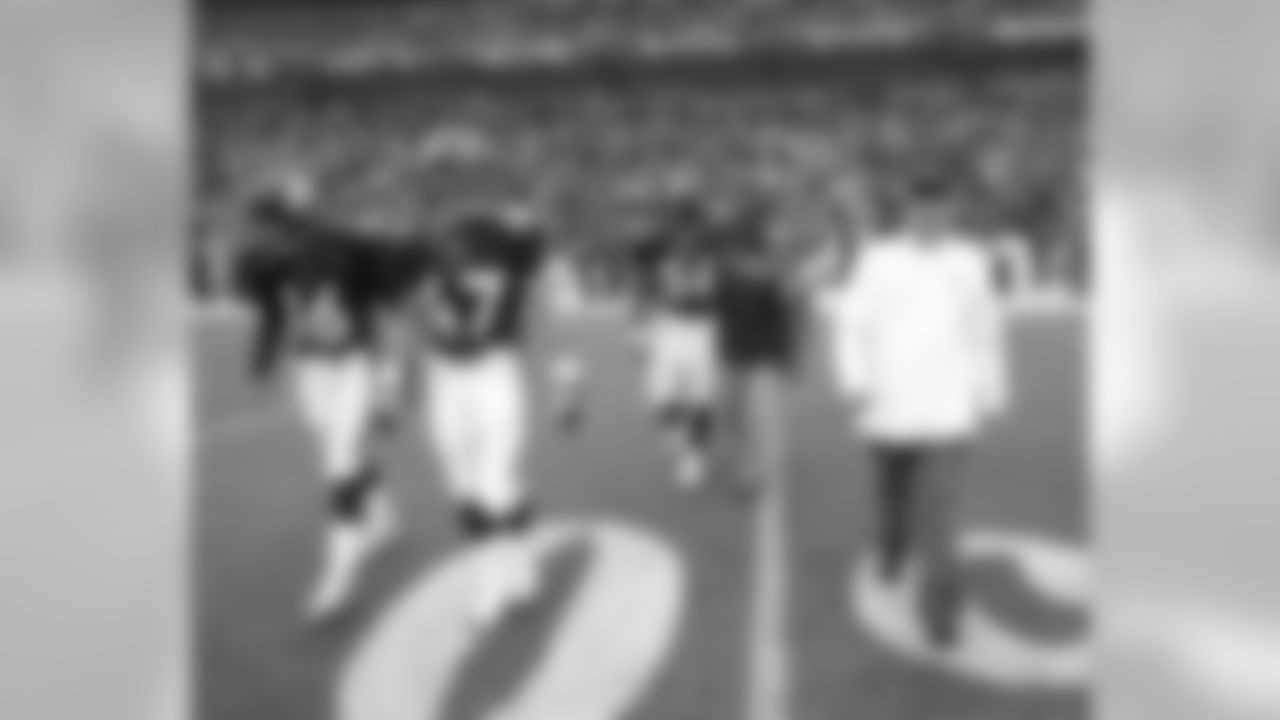
09 October 2005: The Denver Broncos defeat the Washington Redskins 21-19 at Invesco Field at Mile High. Jamie Schwaberow/Rich Clarkson and Associates

Former Syracuse and Denver Broncos running back Floyd Little acknowledges the crowd during a halftime ceremony to retire the No. 44 jersey in Syracuse, N.Y., Saturday, Nov. 12, 2005. (AP Photo/Kevin Rivoli)

Former Denver Broncos running back Floyd Little celebrates with his family after being named to the 2010 Pro Football Hall of Fame class during the Hall of Fame induction announcement at the Super Bowl XLIV Media Center in Ft. Lauderdale, Fla. on Feb. 6, 2010. (AP Photos/Ben Liebenberg)

Hall of Fame running back Floyd Little announces the Denver Broncos pick during the 2010 NFL Draft at Radio City Music Hall in New York City, NY on Apr. 23, 2010. (AP Photo/Ben Liebenberg)

Floyd Little, left, Jerry Rice, center, and Emmitt Smith pose after they were elected to the Pro Football Hall of Fame on Saturday, Feb. 6, 2010 in Fort Lauderdale, Fla. (AP Photo/Wilfredo Lee)

Jerry Rice and Floyd Little share a laugh at the Pro Football Hall of Fame in Canton, Ohio on Aug. 6, 2010. (AP Photo/Ben Liebenberg)

Floyd Little, right, poses with his son, Marc, after enshrinement in the Pro Football Hall of Fame in Canton, Ohio Saturday, Aug. 7, 2010. (AP Photo/Mark Duncan)

Denver Broncos Hall of Famer Floyd Little greets Indianapolis Colts Peyton Manning during the coin toss prior to the NFL game at Invesco Field in Denver,CO.

Denver Broncos Hall of Famer Floyd Little participates in the coin toss prior to the NFL game between the Denver Broncos and the Indianapolis Colts at Invesco Field in Denver,CO.

Denver Broncos Hall of Fame running back Floyd Little's adjusts his Hall of Fame ring before addressing the fans during Floyd Little's Hall of Fame ceremony at Invesco Field in Denver,CO.
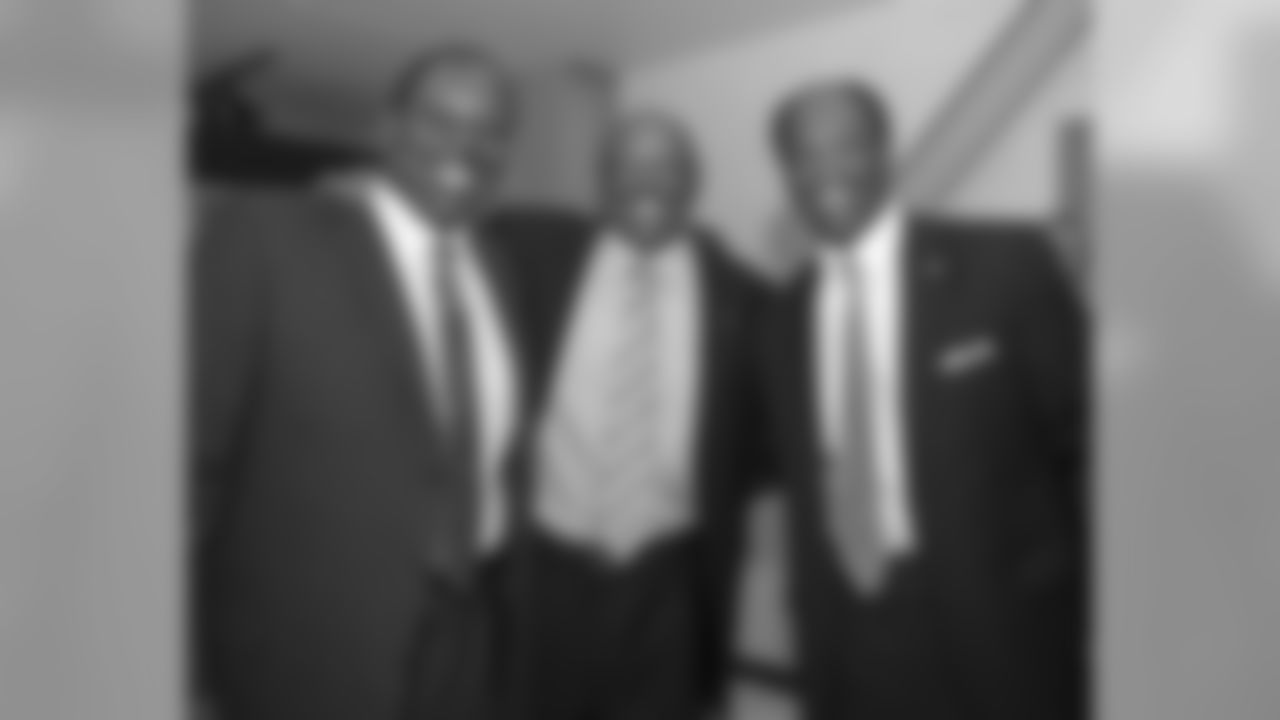
Former Denver Broncos from left to right; Tom Jackson, Floyd Little and Billy Thompson at the Mizel Institute's 2013 Community Enrichment Award night May 22, 2013 where Broncos Owner and CEO Pat Bowlen received the award in front of more than 2,000 guests, including Broncos Hall of Famers.

Denver Broncos fans celebrate at Wall Street for the United in Orange group photo in New York City on February 1, 2014.

Football great Floyd Little, stands next to a statue of himself dedicated during a ceremony on the Syracuse University campus in Syracuse, N.Y., Saturday, Nov. 14, 2015. (AP Photo/Nick Lisi)

Hall of Fame enshrinees Floyd Little and Jim Kelly attend the 2016 Pro Football Hall of Fame group photo at the Pro Football Hall of Fame in Canton, Ohio on Aug. 4, 2016. (Ben Liebenberg via AP)

Floyd Little takes a photo of the mural during the unveiling of owner Pat Bowlen's statue in the Ring of Fame Plaza at Sports Authority Field in Denver, Co. October 18, 2014.

Former Broncos Tom Jackson, Billy Thompson and Floyd Little talk as they look at Little's display case in the Pro Football Hall of Fame in Canton, Ohio. (Ben Swanson)
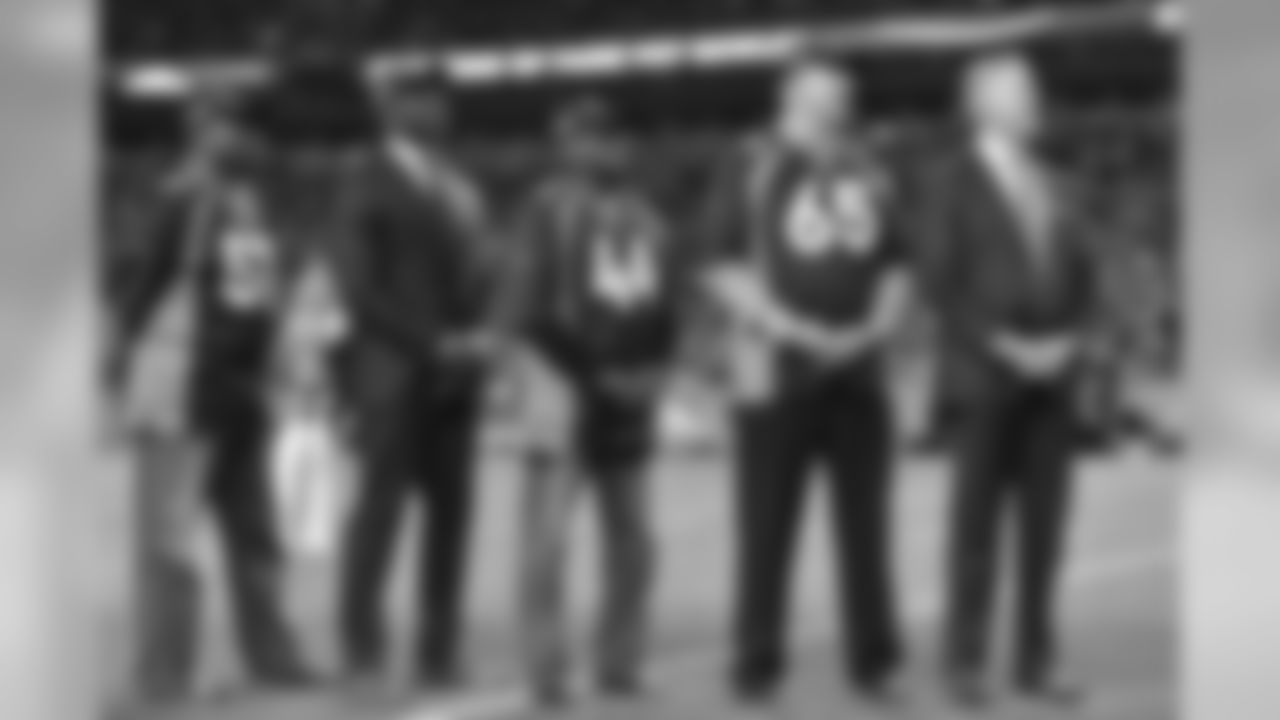
Former Denver Broncos and Ring of Fame members from left to right: Tom Jackson,Shannon Sharpe, Floyd Little Gary Zimmerman and John Elway watch a tribute video during the Pat Bowlen Denver Broncos Ring of Fame induction during halftime ceremonies in the NFL game between the Denver Broncos and the Green Bay Packers at Sports Authority Field in Denver, CO November 1, 2015. (Photo: © Eric Lars Bakke/ Denver Broncos)

Denver Broncos jersey retirement ceremony for Frank Tripucka, Floyd Little, John Elway and Peyton Manning prior to the NFL game between the Broncos and the Indianapolis Colts at Sports Authority Field in Denver, Colo. September 18, 2016.

Terrell Davis and Floyd Little laugh during a ceremony celebrating Davis's induction into the Pro Football Hall of Fame before the game against the Cincinnati Bengals at Sports Authority Field at Mile High in Denver, Colo., November 19, 2017. Photo by Gabriel Christus

Floyd Little hugs Steve Atwater at the Pro Football Hall of Fame's Merlin Olsen Luncheon in Atlanta on February 1, 2019.
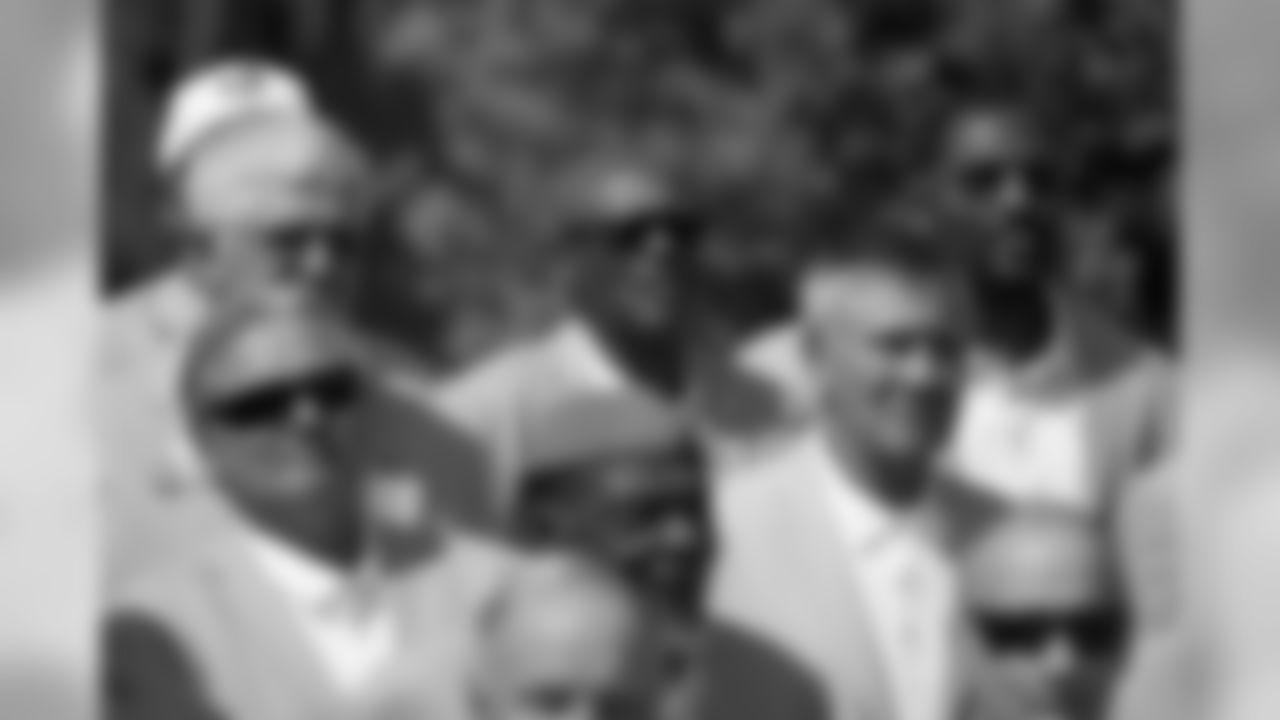
Floyd Little during the Pro Football Hall of Fame group photo in Canton, Ohio, August 2, 2019. Photo by Gabriel Christus

Former Denver Broncos Floyd Little announces the teams pick during the second round of the 2017 NFL Draft on Friday, April 28, 2017 in Philadelphia. (Perry Knotts via AP)

Champ Bailey and Floyd Little during the Pro Football Hall of Fame Game against the Atlanta Falcons in Canton, Ohio, July 20190721, 2019. Photo by Gabriel Christus

Floyd Little talks with a fan before the Broncos' game against the Tennessee Titans at Empower Field at Mile High on October 13, 2019. (Photo by Ben Swanson)

Floyd Little and Rick Upchurch before the Broncos' game against the Tennessee Titans at Empower Field at Mile High on October 13, 2019. (Photo by Ben Swanson)

Floyd Little during the Broncos Top 100 Ceremony at Empower Field at Mile High in Denver, Colorado, October 11, 2019. Photo by Gabriel Christus

Floyd Little and Peyton Manning during player introductions prior to kickoff of the NFL game between the Denver Broncos and the Tennessee Titans , Sunday, Oct.13, 2019 in Denver. (Photo: © Eric Lars Bakke}

Floyd Little holds out his Pro Football Hall of Fame ring in the tunnel during player introductions for the ceremony recognizing the Broncos Top 100 Team before the Broncos' game against the Tennessee Titans at Empower Field at Mile High on October 13, 2019. (Photo by Ben Swanson)

Floyd Little during the NFL game against the Tennessee Titans at Empower Field at Mile High in Denver, Colorado, October 13, 2019. Photo by Gabriel Christus

The Pro Football Hall of Fame bust of Floyd Little at Empower Field at Mile High in Denver, Colorado, October 11, 2019. Photo by Gabriel Christus
In his final four seasons, Little added to his career accolades — two more years with at least 800 rushing yards apiece, new career highs in rushing touchdowns in a single season and yards from scrimmage. But perhaps none of those personal accomplishments meant as much as team's first winning season in 1973.
After a most inauspicious beginning, the Broncos finally had turned the tide and were at last emerging as a team worth respecting. Unfortunately, Little's time in the NFL would end in 1975, just two years shy of the Broncos' first postseason berth.
After Little's final season in 1975, his star loomed large in Broncos and NFL history. When he retired, he was seventh in rushing yards in pro football history and first in franchise history. At that time, his 6,323 career rushing yards were nearly 5,000 more than who was in second place. It was a record that wouldn't be broken until 1998.
Yet all that did not add up to surefire Hall of Fame candidacy, though many fans, analysts and peers thought it should.
For 35 years, Little waited. It was the only personal accomplishment that eluded him. He was elected to the College Football Hall of Fame in 1983. He was a member of the Broncos' inaugural Ring of Fame class in 1984 and his number has been retired.
As the years wore on, the more egregious Little's became, but it was finally rectified in 2010 when he was elected as seniors candidate.
Though the wait had been frustrating, Little was delighted to no end after being inducted. The idea that he was among the league's greats was maybe something that needed little validation. What resonated more was knowing that, in a way, he'd live on long after he passed.
"We are bound to leave everything we accomplished in this lifetime behind, passing it on," Little said in his enshrinement speech. "So leave a legacy that you and your family can be proud [of]."
There's no question Little did that, even outside of football.
After struggling with his education during his teenage years, Little refocused his devotion to learning at Syracuse and later as a student at the University of Denver. At the same time that he was leading a Hall of Fame playing career, Little was also working on a master's degree, graduating in 1975.
"I would go to practice in the day, and I would go to classes at night," Little said in 2019. "When I tell people that I went to Denver Law School at night while I played, they say, 'It's impossible, you can't do that.'
"Well, I guess that's what I've done all my life."















